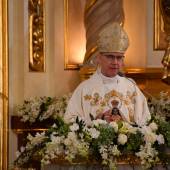Philippines: Church builds memorial for victims of extrajudicial killings

To construct a "Dambana ng Paghilom" (Healing Shrine) for the victims of extrajudicial killings in the Philippines, the Diocese of Kalookan donated a plot of land.
There is a somber memorial in Caloocan City's' Laloma Catholic Cemetery, where hope and mourning coexist.
This hallowed site's main purpose is to remember and honor those who lost their lives in the so-called drug war, which former President Rodrigo Duterte waged and left a trail of destruction in its wake.
With steadfast resolve, Program Paghilom and Fr. Flavie L. Villanueva SVD, founder and president of the Arnold Janssen Kalinga Foundation Inc., led the erection of the memorial. The Diocese of Kalookan kindly supplied a 36-square-meter area of ground within the cemetery, making the memorial possible.
Priests and relatives flocked to the memorial on May 1, 2024, among others. Invoking healing and comfort for the bereaved families, they blessed the shrine. During the initial inurnment, they honored 11 martyrs who found their final resting place within the shrine's vaults.
Among the mourners was Aurora Blas, a widow whose husband died in the drug war. Dr. Raquel Fortun, a forensic pathologist, received assistance from Program Paghilom in uncovering the truth about her husband's gunshot wounds to the head, which his death certificate mistakenly reported as pneumonia.
She could now, at last, reveal the truth about what had happened to her husband. She told people about her experience in the hopes that it would serve as a sobering reminder of how serious inequality is in the country.
The shrine is more than simply a physical building; within, a statue of what appears to be a blindfolded Mother Mary symbolizes the never-ending search for justice and truth, and a cross stands as a sign of hope, an eternal flame at its center. It serves as a representation of defiance against injustice and violence.
The shrine tells stories of injustices that cut short people's lives. It can accommodate up to 600 urns in its 100 vaults.
“As part of Program Paghilom, we have already excavated the remains of 101 victims; they will be the next in line for the next inurnment,” said Villanueva, a human rights activist.
The memorial's purpose is to raise public awareness about the seriousness of extrajudicial executions and their effects on communities and families. By highlighting the importance of every life lost, it opposes the culture of impunity.
Bureaucratic lies will not suppress the truth here. Families who had previously been unable to prioritize finding a place to bury their loved ones because of poverty now had a tangible solution: a location to pay tribute, mourn, and pursue justice.
Villanueva stated, "It will remind our society of the need for justice, accountability, and compassion, as well as to advocate for reforms in law enforcement practices, transparency, and human rights."
“It is a place for healing, introspection, and closure,” he continued. “It gives families a space to grieve together outside, comforts the spirits of the departed, and gives the living the strength to demand transparency and responsibility.”
Radio Veritas Asia (RVA), a media platform of the Catholic Church, aims to share Christ. RVA started in 1969 as a continental Catholic radio station to serve Asian countries in their respective local language, thus earning the tag “the Voice of Asian Christianity.” Responding to the emerging context, RVA embraced media platforms to connect with the global Asian audience via its 21 language websites and various social media platforms.














